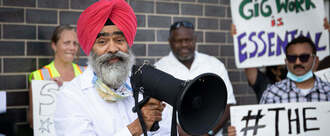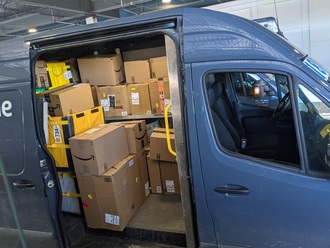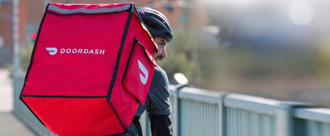-
Addressing Critical Payroll Issues At TelusThe ongoing payroll issues at Telus are not merely administrative glitches; they are eroding the fundamental trust between the company's management and its dedicated employees. Week after week, the frustration intensifies as affected employees grapple with the fallout of negative paychecks, underpayments, and persistent broken promises. This issue is crucial because it extends beyond financial discrepancies – it's about the erosion of morale and confidence within the workforce. The toll on employees' trust is reaching a critical point, impacting their overall job satisfaction and commitment to the company. The importance of resolving these payroll issues promptly cannot be overstated; failure to do so risks a significant decline in employee morale, productivity, and the overall health of the employer-employee relationship.2,197 of 3,000 SignaturesCreated by Telus Employee
-
Corporate Members: Escape the U.S. Chamber of Commerce + Support Climate Policy ProgressPro-climate companies have an opportunity to lead the way when it comes to climate change. But first, they have to escape the influence of the U.S. Chamber of Commerce. The Chamber is one of the largest trade associations in the United States. Its members include corporations like Exxon, Shell, ConocoPhillips, and Chevron. It also has a long history of being anti-climate, spending millions lobbying against climate policy progress. Most recently, the Chamber worked to block the 2022 Inflation Reduction Act, which invested $369 billion in clean energy and policies to reduce carbon emissions by 40% by 2030. The Inflation Reduction Act is our best shot at avoiding the worst impacts of climate change. Several pro-climate companies, such as Amazon, Google, and Microsoft, are also members of the U.S. Chamber of Commerce. These companies are known for their climate forward initiatives, which conflict with the actions of the Chamber. Clearly, there’s a disconnect here. To be climate leaders, these companies must stop their support for the U.S. Chamber of Commerce’s obstruction. It’s time for pro-climate companies to LEAVE the U.S. Chamber of Commerce and LEAD by lobbying for bold and just climate policies at the federal, state and local levels, aligning political contributions with climate leadership and leading pro-climate coalitions in advocating strongly for pro-climate policies. Tell pro-climate companies it’s time to ESCAPE THE CHAMBER.2,243 of 3,000 SignaturesCreated by Climate Voice
-
Shipt’s app glitches hurt all shoppers and violates CA’s Protect App-Based Drivers & Services ActShipt’s platform glitches take time and money away from shoppers. Since Shipt has fully implemented The California Protect App-Based Drivers and Services act on it’s platform, California Shipt shoppers have been timed out erroneously from the platform due to an app glitch and shoppers have also reported to Shipt that they are not getting an accurate guaranteed minimum due to the current app glitch. In compliance with California’s Protect App-Based Drivers and Services Act, Shipt created a step on it’s platform requiring shoppers to swipe “Head to Store” when doing so as a way for Shipt to record a shoppers engaged time and miles. After an app update on Oct 20, 2022, shoppers began to notice an issue with the head to store time in the app. For delivery only orders, the head to store time changes by the minute and for Shop and Deliver orders the app resets, forcing shoppers to re-swipe Head to Store. In some cases, shoppers who have already started shopping, are forced to re-swipe and rescan the barcodes for all the items already shopped. This would also mean all the time spent shopping an order and miles driven to the store would not be accurate. According to California’s Protect App-Based Drivers and Services Act, “ride-share and delivery drivers deserve economic security.” Pursuant to this act, a network company shall ensure a guaranteed minimum for each app-based driver that cannot be reduced and shall apply for all engaged time spent completing that rideshare request or delivery request. The act defines “engaged miles” as all miles driven during engaged time and “engaged time” is defined as the period of time, as recorded in a network company’s online-enabled application or platform, from when an app-based driver accepts a rideshare request or delivery request to when the app-based driver completes that rideshare request or delivery request. Due to the nature in which Shipt offers its shoppers orders, the platform has created a swipe function to record its shoppers engaged time, however the app’s current glitch prevents Shipt from accurately recording shoppers engaged time and miles. Shoppers have reported the timed out app glitch to Shipt for over a year, and the current “Head to Store” app glitch to Shipt but Shipt has not given any notice to California shoppers indicating that it is aware of the problem nor have California shoppers received any reassurance that any long standing app issues are being addressed. These app glitches are in breach of California’s Protect App-Based Drivers and Services Act, which was overwhelmingly approved by California voters in 2020. Shipt states that it’s the drivers responsibility to swipe head to store when doing so in order for Shipt to record a shoppers engaged time and miles, but what recourse do shoppers have when shoppers have completed this step and are forced to do it again, erasing initial engaged time and miles?626 of 800 SignaturesCreated by Concerned Shipt Shoppers
-
Tell Ally Financial: We Demand Location Flexible WorkWe believe that Ally should encourage, not prohibit, flexible work to build a more diverse and successful company where we can feel comfortable to “be an open, diverse, and inclusive culture” together.10 of 100 SignaturesCreated by J F
-
Etsy: Stand for Small Businesses, Not Corporate Profits.Etsy was founded with a vision of "keeping commerce human" by "democratizing access to entrepreneurship." As a result, people who have been marginalized in traditional retail economies -- women, people of color, LGBTQ people, neurodivergent people, etc. -- make up a significant proportion of Etsy's sellers. For many of us, Etsy makes up our main source of income. But as Etsy has strayed further and further from its founding vision over the years, what began as an experiment in marketplace democracy has come to resemble a dictatorial relationship between a faceless tech empire and millions of exploited, majority-women craftspeople. Unlike employees or tenants in traditional retail marketplace settings, Etsy can fire or evict us at any time, for any reason, with no recourse. Our fees (the rent we pay as tenants of Etsy's marketplace) can be unilaterally raised any time Etsy feels like it. Etsy can and does withhold payments to sellers for months at a time, without any process for appealing or speaking with a representative of the company. Even though it's the hard work of Etsy's sellers who've made it the massively successful company it is today, we have fewer rights and less of a voice in our workplaces than ever. It doesn't need to be this way! Etsy can be a successful and profitable company while still treating its sellers fairly and ethically. Etsy can be the force for good it initially set out to be. And together, Etsy sellers and the buyers who support us can show hyper-exploited platform workers everywhere that there's a better way, if we unite in solidarity and work together to achieve it!87,095 of 100,000 SignaturesCreated by Kristi Cassidy

-
Classify Samsung US Sales Experts As EmployeesThis is a human rights issue. There are LGBTQ+ individuals who rely on Samsung US and iAdvize as the only place who will accept them. These people need to be protected. There are single parents who rely on Samsung US and iAdvize as their sole source of income. These people need to be protected. There are disabled individuals who rely on Samsung US and iAdvize as the only job that will allow them the flexibility they need. These people need to be protected. There are college students and dropouts who rely on Samsung US and iAdvize as the only job that will allow them to work from home or their dorm. These people need to be protected. We are human beings who just want to help customers pick out a new phone, television, refrigerator, or laptop. But we'd also like to be treated with respect and be paid a living wage while doing it. We don't want something radical, we want something equitable.52 of 100 SignaturesCreated by Samsung Experts
-
END THE HARM OF MASS REJECTIONSWorkers behind AI, even invisible, still matter. Our stories have been neglected for years and it's our time to feel safer while doing our work in an unbalanced platform that only protects requester's voices. A victory for us is a victory for all workers. Petition FAQ 1. You may sign the petition with your first name and last initial. Full name is not required. 2. Working for Mturk and working on Mturk are the same thing for our purposes. 3. Email addresses will not be publicly displayed.2,531 of 3,000 SignaturesCreated by Turkopticon (TO)
-
Gig Workers Demand A Fair Deactivation ProcessPeople working in the gig economy, such as drivers for transportation giants like Uber and Lyft, face many challenges. They don’t receive any employee benefits or protections, and the work they do is also inherently dangerous. Drivers lose their lives in carjacking incidents, they have a high likelihood of being in an accident due to long hours on the road and they are often targeted by municipalities for expensive tickets. To add insult to injury, some of the most loyal, hardworking drivers can often find themselves out of a job due to unverified customer complaints. At the moment, if a customer complains about a driver to Uber or Lyft, even if there is no evidence that the claim is valid, drivers can be deactivated and have no ability to appeal or defend themselves against the allegation. Riders are incentivized to complain as they receive discounts if they say their driver did something wrong. There is no accountability or transparency in how these complaints are handled by the companies. This places thousands of workers and their families in financial hardship. Nationally, about 70% of Uber and Lyft drivers are BIPOC or immigrants, and poor labor standards further harm these already vulnerable populations, even while the City of Chicago and gig companies publicly claim to be working to improve conditions for these very people. These workers keep our city running every day, and made Uber and Lyft executives rich with their labor; they deserve a voice! Manminder Sethi, one of the original drivers in Milwaukee Wisconsin, started driving on Uber black first and later joined Uber X nearly 7 years ago. He had over 19000 rides and a rating of 4.93 when he was suddenly deactivated. When he tried to find out why, he was given reasons that ranged from unsafe driving to sexual harassment. Manminder has had no tickets related to unsafe driving, and he offered to provide the dash cam footage for the ride in question but Uber never responded to his requests. Chicago driver Mehrez Sahli, another long-time driver on the platform, started working with Uber Taxi first for a year or two, then also moved on to Uber X. He had 5,710 trips over 3.5 years on Uber X and a rating of 4.94 when he was suddenly deactivated. When he went to the Uber hub to ask why, he was told he was “manipulating” surge pricing by moving from a low surge area to a high surge area before accepting a ride. As this is the way the app is intended to work (surge pay is incentive to drive from a less busy area to a busy area) it is still unclear what the real reason for the deactivation was. However, in Mehrez’s case, not only was he deactivated from Uber, but Uber then also communicated something to the City of Chicago who then communicated that information to Lyft and he was summarily dismissed from Lyft as well. Typically, this is the process that would be followed if a driver were being deactivated for a serious offence such as assault or intoxication on the job, yet no such allegation has ever been communicated to Mehrez. Maurice Clark of Chicago was accused of falling asleep behind the wheel and was deactivated from Lyft with a driver rating of 4.98 and 5,734 rides under his belt. He has never had a ticket or been in an accident in relation to unsafe driving, and the details of the ride have been withheld from him. He was told by Lyft in an email that he was not permitted to “appeal or protest” the decision. Another Chicago driver, Hiep Can Tran, was deactivated from Uber due to an unspecified customer complaint after he completed 6,034 trips. He has called Uber repeatedly and visited the Uber hub but has never been told the details of the complaint. Hiep was supporting his small children using the money he made driving Uber and losing his income suddenly was a major financial hardship for him. He has been able to start driving for Lyft, but he has not been earning as much and still wants to know why he was deactivated from Uber. He maintains a 4.99 driver rating on Lyft at this time and has no tickets or accidents on his driving record. JC Muhammad of Chicago was deactivated due to a customer complaining that he was speeding after completing 3035 trips. He has received no tickets or warnings due to speed, and in fact believes that the complaint was made sarcastically as he typically drives the speed limit or under. Uber has offered no proof of the violation and again has denied JC the ability to defend himself or provide proof to the contrary.4,307 of 5,000 SignaturesCreated by Lori Simmons
-
Gig Workers Demand Occupational Death BenefitsOver the course of the last year, gig workers have risked our health, our lives, and the safety of our families to provide essential services to our communities. Gig workers are intentionally misclassified as independent contractors by our employers, not just to cheat us out of earning minimum wage, but also to skip the tab for workers’ compensation, sick pay, employer-sponsored healthcare, paid family leave, and unemployment insurance. Throughout the pandemic, while risking our health, and our lives, gig companies (Uber, Lyft, Instacart, DoorDash and Postmates) spent an astonishing $205,000,000 to subvert our rights to proper classification, and they won. During a pandemic in which our labor was deemed essential, we were simultaneously stripped of even the most basic rights of employment. We've included stories of gig workers that lost their lives while working, leaving their families unprotected and utterly vulnerable. Lynn Murray, 62, was viciously gunned down in the mass shooting at King Soopers in Boulder, Colorado. https://www.denverpost.com/2021/03/23/boulder-shooting-victim-lynn-murray/. According to the Denver Post, Lynn, a beloved wife, and mother of two, was a former photo director who previously worked for big-name magazines like Glamour, Marie Claire, and Cosmopolitan. In her retirement, she was a gig worker who shopped for Instacart. She was brutally murdered while filling an Instacart order. Mohammad Anwar, 66, was fatally attacked in Washington, D.C. Mohammad was a father of three and grandfather of four and was violently murdered while delivering an order for UberEats. https://www.nbcwashington.com/news/local/two-girls-13-and-15-used-stun-gun-in-fatal-armed-carjacking-near-nationals-park-police-say/2617947/ Ryan Munsie Graham, 31, was murdered while delivering for UberEats in Haltom City, Texas. Ryan left behind a husband and three small children. https://kvia.com/news/texas/2021/01/30/texas-mom-of-3-working-side-job-as-uber-eats-driver-allegedly-killed-by-14-year-old-boys/ Timothy Allen, 65, murdered while delivering packages for Amazon Flex in West Dallas, Texas. Timothy was an extremely talented musician. https://www.fox4news.com/news/trackdown-help-identify-persons-of-interest-in-timothy-allens-murder Yusuf Ozgur, 56, was a treasured husband and father of two. Yusuf was murdered while picking up an order for DoorDash in Manassas, Virginia. https://people.com/crime/doordash-delivery-man-killed-christmas-robbery-dennys/ Cherno Ceesay, 28, was robbed and murdered while driving for Uber in Issaquah, Washington. https://www.q13fox.com/news/couple-accused-of-stabbing-killing-uber-driver-in-issaquah Yousef Al-Gabri, 56, was murdered in Detroit, Michigan, after picking up a passenger for Uber. Yousef is survived by his four children. https://www.clickondetroit.com/news/local/2021/03/12/detroit-man-charged-with-1st-degree-murder-in-shooting-death-of-uber-driver/ When Instacart Shopper, Lynn Murray, was killed in the mass shooting at King Soopers in Boulder, CO, while filling an Instacart order, her family did not receive the same benefits that were extended to grocery store workers that were killed during the massacre. If Lynn were properly classified as an employee, her family would receive occupational death benefits that all Colorado employees are entitled to like survivor benefits and funeral benefits. She would have also qualified for life insurance, which Instacart offers to its properly classified employees. Even in the most extreme cases, gig companies have demonstrated that they won’t properly step up to honor the rights and protections afforded to properly classified workers. Gig work is dangerous work. Even before the pandemic, “Uber and Lyft drivers face fatal risks that are 1.1 and 2.6 times the fatality rate for police officers and firefighters. The corresponding estimates for Grubhub are 2.0 and 4.4.” https://www.sfchronicle.com/opinion/openforum/amp/Open-Forum-Driving-for-Uber-Lyft-GrubHub-and-14123731.php Undoubtedly, as gig workers were declared essential workers and still expected to show up, overwhelmingly unprotected, the pandemic has only added insult to injury. With our occupational risks of death being higher than first responders, there is no doubt that we need the full host of occupational injury and death protections provided through workers’ compensation. When gig workers die at work we die without security, and often our families must rely on the generosity of strangers and crowdfunding to even cover funeral expenses. Due to the high-profile nature of Lynn Murray’s brutal murder, Instacart publicly donated $50,000 to a GoFundMe for her family. Gig companies pocket hundreds of millions of dollars they should have paid annually into state-run workers’ compensation programs. Any token donations to families are always a fraction of a cent on the dollar of what they should be paying to ensure workers are protected in our workplaces. Make no mistake, a company that deprives its workers of essential workplace protections through intentional misclassification deserves no accolades for a one-time donation to a single-family. We need the security of guaranteed benefits, crowdsourcing is not a safety net. What happens when the death of a gig worker is not part of national headlines? What is the recourse for grieving families when they’re left to seek damages from some of the wealthiest and most resourced corporations in the nation? The answer is infuriating. Families are left to fend for themselves in addition to the trauma and grief of unexpectedly losing a family member. We encourage you to read more about gig workers that have lost their lives while working and remember that they represent only a fraction of the actual human cost of gig work.2,864 of 3,000 SignaturesCreated by Vanessa Bain
-
Amazon drivers demand reasonable workloadWe work long, tiresome hours for Amazon. Our work generates billions of dollars in revenue for this corporation. We are valuable and essential to this company and we demand to be treated with respect.220 of 300 SignaturesCreated by Anthony B
-
DoorDash: Publicly Commit to Paying Dashers a Living WageAs a dasher, you pay for your own gas, upkeep on your vehicles, and you are not paid for time spent waiting for a pickup. The CEOs of the companies you work for are mega-rich, but you are not afforded basic benefits such as health care or paid time off. And while prices have increased for customers through vague service fees to cover substandard benefits, much of that money will never make it into the hands of workers. Under the new law in California, delivery workers of DoorDash will receive almost half of the IRS rate for mileage, only .30/mile. No matter where you come from, the color of your skin, or the work that you do, a job should help you pay the bills and leave you time with your family. In exchange for your time and effort, you should earn the pay and benefits that provide for a good living and a bright future. Working via an app and setting your own hours shouldn’t mean making pennies and having no safety net if you get sick or injured. It doesn’t have to be this way. A company worth almost $3 billion is able to pay you a living wage - they are just choosing not to. DoorDash drivers deserve better pay. Sign if you agree.4,225 of 5,000 SignaturesCreated by Gig Workers Rising
-
Pay minimum wage for food food runnnersThey make less than a server and do all the servers work for them. It’s not equal pay. And can’t live off 2.83 an hour.14 of 100 SignaturesCreated by Jess J
Quick Links

Quick Links













